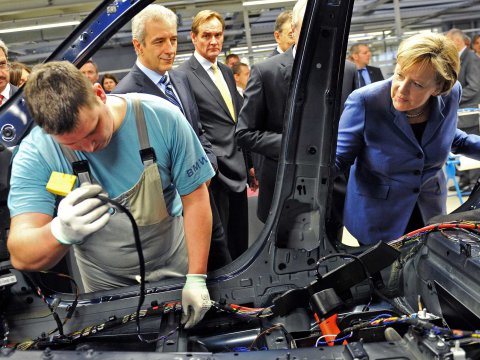January final manufacturing PMIs: slowdown confirmed

• Euro area January final manufacturing PMIs were unchanged from the flash reading at 52.3, consolidating December's one and a half year high. Lower output and new orders drove down manufacturing confidence in January, while hiring intentions edged up to a more than four year peak. Excluding input and output prices, which both fell on weaker oil prices, all components remained well above their long-term average, suggesting some potential improvement in Q1 industrial activity. This is in line with our view that industrial production may recover in Q1 16, as negative effects related to mild weather fade. In terms of countries, confidence consolidated in Germany, France and Italy in January, while rebounding in Spain.
• German PMIs were slightly revised up from the flash reading to 52.3, still declining over the month; while French PMIs were confirmed at 50.0, a 5 month low. Stronger output and employment drove the bulk of the German headline upward revision. Yet output dropped in January and new orders consolidated on the back of weaker external demand. Overall, German PMIs made a mild start to the year suggesting industrial activity is unlikely to gather significant momentum in Q1. However, the gap between manufacturing PMIs and industrial production widened in 2015 and we believe January factory orders (due to be released on Friday, consensus expecting a -0.5% m/m decline) may give a more reliable insight into the health of the German manufacturing sector at the beginning of 2016. In France, manufacturing PMIs were unchanged at 50.0 with weaker new orders and output pushing the headline down. This contrasts somewhat with the positively oriented INSEE business survey and overall we remain of the view that GDP and industrial activity should rebound a little in Q1 after the Q4 soft patch.
• Italian PMIs surprised to the downside, declining from multi-years high, while Spanish PMIs started the year on a solid footing, supported by strong demand. In Italy, manufacturing PMIs dropped to a four month low at 53.2 (-2.4 points). The decline was primarily driven by weaker output and new orders, with the weakness of the latter coming mainly from domestic demand. Yet both components remained well above their long-term average, consolidating from multi-year highs. Hiring intentions remained elevated at a 7 month peak, and input and output prices both dipped on the back of lower commodity prices. Overall, despite some moderation, today’s data suggest that the manufacturing sector should remain supportive of growth in Q1 16. Meanwhile, Spanish PMIs beat expectations, rising significantly to 55.4 (+2.4 points), an eight month high. The improvement was broad-based across components, suggesting the rebound in confidence has solid foundations. Output posted the strongest print since May 2015, fuelled by booming new orders (+3.3 points to 57.8). Anecdotal evidence signaled that panelists are optimistic about the growth outlook, expecting further rises in new orders in the coming months, which translated into pre-production inventories at the strongest level since May 2004. Overall today’s data signals that manufacturing sector performance should remain robust at the start of 2016, despite political uncertainty stemming from inconclusive December general elections. Elsewhere, Irish PMIs rose marginally to 54.3, as a modest decline in output was more than offset by further rise in new orders. The latter was supported by strong domestic and external demands, with new export orders hitting a six month high. Deflationary pressures intensified on renewed weakness in oil prices, with both input and output prices falling well below the 50-threshold (46.7 and 47.6 respectively). Meanwhile, employment and stock of purchases held firm. Overall PMIs continued to point to solid manufacturing activity ahead.
Barclays
Economics Research | Instant Insights

